新概念二册lesson45课
2016 12 新概念英语第二册 Lesson 45 A clear conscience 最新版

A. Questions on the text 1. What did Sam Benton lose while taking his savings to the post office? He had lost his wallet on his way to the post office. 2. What happened after three months passed? After three months Sam found his wallet outside his front door. It contained half the money he had lost, together with a note which said: 'A thief, yes, but only 50 per cent a thief!'
forest ['fɒrɪst] n. 森林 risk [rɪsk] n. 危险,冒险 picnic ['pɪknɪk] n. 野餐
edge [edʒ] n. 边缘
strap [stræp] n. 带,皮带
mend [mend] v. 修理
breath [breθ] n. 呼吸 possession [pə'zeʃ(ə)n] n. 所有 continue [kən'tɪnjuː] to do:接着做 contents ['kɒntents] n. (常用复数)内有的物品 through [θruː] :浏览,翻看
Listen and anwser: 1.This story is about ___.
A. Sam Benth B. Sam Benton C. Benth
2.Did he found his wallet outside his front door ?
新概念英语第二册第45课课件
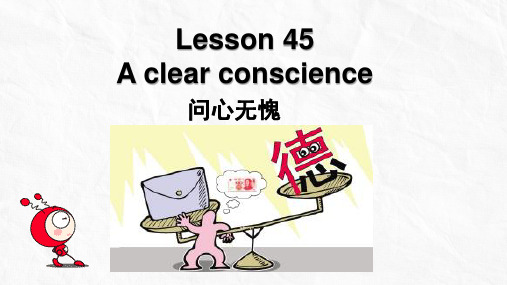
Key points analysis
1.The whole village soon learnt that a large sum of money had been lost. 主从复合句,that引导宾语从句。 (1)village在这里为总称,指“村民”,the whole village指“全村的人”,后面通常跟单数 动词(有时也可视为复数)
Part two: New words
[klɪər] [ˈkɒnʃəns] [ˈwɒlɪt] [ˈseɪvɪŋz] [ˈvɪlɪdʒər] [pə'sent]
clear 无罪的,不亏心的 conscience 良心,道德心 wallet 皮夹,钱夹 savings 存款 villager 村民 per cent 百分之...
他一边打扫房间一边听音乐。 He listened to music while须用从句: 我打扫房间时,他在听音乐 He listened to music while I was cleaning the room.
4.Sam was sure that the wallet must have been found by one of the villagers…
Part five: grammar
被动语态 被动语态的基本形式为助动词be + 及
物动词的过去分词,即be done。被动 语态的不同时态是通过助动词be的时态 变化来体现的,其人称和数方面应与主 语保持一致。在初中阶段要求掌握八种 时态的被动语态和含有情态动词的被动 语态,其具体变化为:
一般现在时:am/is/are done 一般过去时:was/were done 现在完成时:have /has been done 过去完成时:had been done 现在进行时:am/is/are being
新概念英语第二册第45课课文详解及课后答案

5. b 本句是一个被动语态句。只有b. by 表示“被”的意思,最符合语法和题目意思。a. from , c. out of, d. of
都没有“被”的意思,所以都不对。
6. d 本句是一个特殊疑问句,针对介词in的宾语提问的,回答是A newspaper. a. where 是询问地点的;b. who
课后答案详解
1. b 根据课文的实际内容,可以推断只有b. had found Sam’s wallet and kept it 是课文暗示的真实情况。 a.
had stolen Sam’s wallet 不够确切,因为课文中的意思是Sam was sure that the wallet
lesson 45
clear adj 无罪的,不亏心的
conscienceห้องสมุดไป่ตู้n 良心,道德心
wallet n 皮夹,钱夹
savings n 存款
villager n 村民
percent 百分之...
clear conscience 问心无愧
guilty conscience 问心有愧
send = take/give
send/take/give sb sth
双宾语一般用离动词最近的宾语来做被动态的主语
sb be sent sth
send sth to sb
sth be sent to sb
no.6
对名词的提问用what
no.10
contain/container
my som and i went there。
the picture said...图片上说
新概念第二册第45课语言点

1.without doing sth.没有做某事2.catch up with sb. 追上某人3.Reading is my favourite hobby.阅读是我最喜欢的爱好4.run after追逐,追赶5. run through the park跑着穿过公园6. run straight at the man直冲向这个人7.run away逃跑8.at the edge of 在…的边上9. in their possession归他们所有10.take the risk 冒险11.out of breath气喘吁吁12.continue to do sth. 继续做某事13.go through 浏览,翻看14.get a fright下了一Lesson 45 clear conscienceclear adj.无罪的,不亏心的conscience n.良心,道德心whole 全部的sum 金额,一笔,总结Sam Benton 萨姆·本顿butcher n.屠户wallet n.皮夹,钱夹savings n.存款villager n.村民per cent (percent) 百分之…Phrases:1.the whole village整个村子2. a large sum of money一大笔钱3.be sure (that )确信4.return sth to sb. 把某物归还某人5.wrap up包裹6.in time及时;最后,终于7.pay back 归还8.in this way以这种方式9.have the conscience to do sth.厚着脸皮做某事in all conscience凭良心说a bad conscience 问心有愧10. a large sum of money 一大笔钱11.steal sth. from sb. 从某人那里偷来某物12. sum up计算,总结*clear(1)清澈的,透明的;(皮肤)洁净的We could see fish in the clear water.我们看到清澈的水中有鱼。
新概念Lesson 45-46(第二课时)
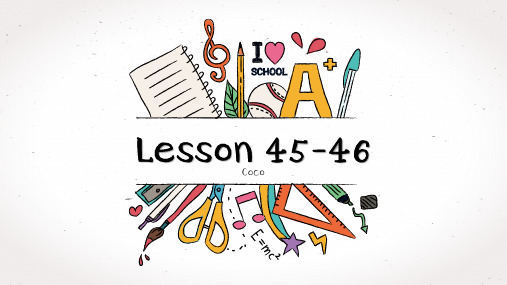
lift the table 举起桌子 lift the chair 搬起凳子
他能举起桌子吗? Can he lift the table?
No,he can’t. He can’t lift the table, but he can lift the chair.
★ lift v. 拿起,搬起,举起 lift sth. 举起···
可以指心情,天气,相貌, 味道等 1. 糟糕的 How are you today? Terrible!
My handwriting is terrible.
Wang Xizhi’s handwriting is good. 25
★ terrible /`terəbl/ adj.糟糕的,可怕的
2. 可怕的 My sister is a terrible woman.
children’s day
(2)若名词有复数词尾又是s, 只加“ ’ ”。
the students’ teacher
the workers’ boss
(3)复合名词,“’s”加在最后。
my mother-in-law’s home 我岳母/婆婆的家
扩展:boss+y = bossy 专横的;蛮不讲理的
概念: 一般用来表示人或物经常性或习惯性的动作或状态。
一般现在时
用法 1 表示习惯性、经常性、反复的动作或存在的状态,常与 always,often,sometimes, every day等频率副词或时间状 语连用
他们让我不要看电视。 They ask me not to watch TV.
22
★ ask /ɑ:sk/ 询问,请求,要求
ask for sth 请求,要求某样东西
新概念英语第二册 Lesson45 A clear conscience 课件

New words
1. clear 2. conscience 3. wallet 4. savings 5. villager 6. per cent
[klɪə] ['kɒnʃ(ə)ns] ['wɒlɪt] ['sevɪŋz] ['vɪlɪdʒə] [pə'sent]
adj. 无罪的,不亏心的 n. 良心,道德心 n. 皮夹,钱夹 n. 存款 n. 村民 百分之……
The thief included a note every time he sent Sam more money. 5. What did the last note say?
The last note said: ‘I am 100 per cent honest now!’
Retell the story
village--leant--had been lost butcher--wallet--post office sure--found--villagers-not returned three months-morning-outside newspaper--contained--half note--'50 percent' two months--sent--note--'25 percent' all--note--'100 percent'
(must lose ) 5. The PLA w__a_s _fo_u_n_d_e_d_on August 1st,1927.( found )
6. Our local bank _w__a_s_r_o_b_b_ed__ last week.( rob ) 7. If you _a_re__se_n_t__abroad by your company , you will be paid a
新概念英语第二册Lesson 45
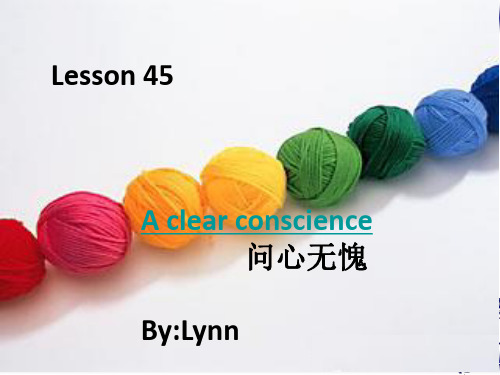
some proverb on thieves
Once a thief, always a thief.
偷盗一次,做贼一世。
Set a thief to catch a thief.
以贼捉贼。
A thief is a thief, whether he steal a diamond or a cucumber.
It had been wrapped up in newspaper and it contained half the money he had lost, together with a note which said: 'A thief, yes, but only 50 per cent a thief!' Two months later, some more money was sent to Sam with another note: 'Only 25 per cent a thief now!' In time, all Sam's money was paid back in this way. The last note said: 'I am 100 per cent honest now!'
‹#›
• villager n.村民,乡村居民
•
• • • • • • • • • •
village 1) n.村,村庄(有教堂) hamlet n.小村庄(无教堂) town 2) adj.村庄的 a fishing village 渔村 a farming village 农村 village life 乡村生活 3)the village 村民(集合说法) eg. The whole village is going to welcome the foreigner. 全村村民要去迎接那个外国人。 -er通常指的足职业: waiter 服务员 manager 经理 baker 面包师 Producer 生产商 teacher 老师 driver 司机 reporter 记者 reader读者 rider 骑手 winner 胜者 farmer 农民 runner 跑步运动员 leader 领导 writer 作家 ‹#› player 选手
新概念第二册Lesson 45 (共23张PPT)

• Two months later, some more money was sent to Sam with another note: 'Only 25 per cent a thief now!'
• be sent to • another • one... the other...
• 2) v. 把…..缠绕,把…..披在 • She wrapped a bath towel around the baby. • 她用浴巾把这个婴儿裹了起来。 • be wrapped up in 全神贯注于 • He was wrapped up in watching TV. • 他全神贯注地在看电视。
• butcher ['butʃə] • 1) n. 屠夫;肉商 • the butcher’s 肉铺,肉店 • 2) v. 屠杀(动物),残杀(人) • while引导的从句主语与主句主语相同,故
可省略。原句应为:while he was taking his savings to the post office
• wrap [ræp] • 1) v. 包裹 (wrapped, wrapped) • The girl wrapped up her Christmas gift. • 这个女孩把她的圣诞礼物包起来。
• The hills were wrapped in the mist. • 山丘笼罩在雾里。
against cancer. • 他发现这种疗法对治疗癌症非常有效。
• It had been wrapped up in newspaper and it contained half the money he had lost, together with a note which said: 'A thief, yes, but only 50 per cent a thief!'
新概念第二册45课讲解及课后答案

新概念英语第二册第45课课文重难点Further notes on the text1.A clear conscience, (标题)问心无愧。
clear在这里的含义为"清白的"、"无罪的",因此这个短语又可译为"清白的良心",相当于a good conscience,反义词为a bad conscience(感到内疚)。
2.The whole village soon learnt that a large sum of money had been lost. 整个村子很快知道,有一大笔钱丢失了。
(1)village在这里为总称,指"村民",the whole village指"全村的人",后面通常跟单数动词(有时也可视为复数):The whole village was excited by the news.这消息使全村的人兴奋。
(2)learn在句中的含义为"获悉"、"得知":I've just learnt that she was ill.我刚刚得知她病了。
3.Sam Benton, the local butcher, had lost his wallet while taking his savings to the post office. 当地的屠户萨姆·本顿在把存款送往邮局的途中把钱包丢了。
taking为现在分词。
与动名词相似,它也可以有自己的宾语、状语等。
在连词while之后,现在分词短语的作用相当于一个时间状语从句:…while he was taking his savings to the post office。
现在分词这样用的前提是两个动词的主语是同一个,并且这两个动作通常是同时发生的:He listened to music while cleaning the room.他一边打扫房间一边听音乐。
新概念45课 Lesson 45 The boss's letter

can
能够
( 4 )boss ( 6 ) ter1 )can ( 5 )handwriting
a minute 一会儿 Can you come here a minute please ?
请你进来一下好吗?
• v. 询问;邀请
Ask her please. 请问问她。
Can you type this letter for the boss please, Pamela? PAMELA: Yes, of course I can. BOB: Here you are. PAMELA: Thank you, Bob. Bob! BOB: Yes? What’s the matter? PAMELA: I can't type this letter. I can't read it! The boss's handwriting is terrible!
Can Mary type the letter for me ? Yes,teacher. Can you type the letter for teacher? Of course I can.
Can you put on your coat? Yes ,I can. What can you do ? I can put on my coat.
Can you come here a minute please, Bob? Yes, sir? Yes, I can. Can she type this letter for me? Yes, sir. Yes, she can. Can you type this letter for the boss please, Pamela? Yes, of course I can.
新概念英语第二册课后练习题答案详解(第45课)

新概念英语第二册课后练习题答案详解(第45课)新概念英语第二册课后习题Lesson 451. b根据课文的实际内容,能够推断只有b. had found Sam’swallet and kept it 是课文暗示的真实情况。
a. had stolenSam’s wallet 不够确切,因为课文中的意思是Sam was sure that the wallet must have been found by one of the villagers (山姆确信那钱包是被某个村民捡到了,而不是偷走了);c. had lostSam’s wallet 与课文的意思相反;d. had taken the wallet from Sam’s pocket 不是课文提及的内容。
2. d根据课文所描述的情况,只有d. returned all the money 与课文事实相符,其他3个选择都与事实不符。
3. aa. when,b. while,c. as 和d. just as 都能够做连词,引导时间从句,表示“当……时”,本句只能选a.在前半句是过去实行时,后半句是一般过去时的情况下,中间多用when,表示两个动作同时发生,“正当……时”,而后3个选择引导的时间从句大都是实行时态。
4. b本句只有选b. in 意思才讲得通。
He keeps his savings inthe post office.(他把存款放在邮局保管)。
本句中的动词keep(存放,保管)不是表示“去向”的,所以不能选a. to (到)和d. into(进入),c. on(在……上面)也不合乎题目意思,不能用on the post office. 而应该是in the post office.(在邮局里),所以选b.5. b本句是一个被动语态句。
只有b. by 表示“被”的意思,最符合语法和题目意思。
a. from , c. out of, d. of 都没有“被”的意思,所以都不对。
新概念第二册-Lesson 45 A clear conscience

CLEAR
clear /klɪə(r)/ adj. 清楚的, 透明的,无罪的,不亏心的 clear glass 透明的玻璃 E.g. Our new television has a very clear picture. 我们的新电视影像十分清晰。 E.g. We have a clear view of the ocean from our hotel window. 从饭店的视窗我们可以一览无遗地看到大海。 a clear conscience 问心无愧
PERCENT
percent /pəˈsɛnt/ n. 百分比 adj. & adv. 每一百中 词根词缀: per每+词根cent(i) l来自拉丁语名词centum, 意思是百,百分之一 E.g. You got 20 percent of the answers right - that means one in every five. 你的答 案中20%是對的,也就是說每五個中有一個是對的。 E.g. Most shopping centers have knocked ten percent off the price. 大部分购物中 心打九折.-《简明英汉词典》
VILLAGER
village /ˈvɪlɪdʒ/ n. 村庄 We visited towns and villages all over Spain. 我们走遍了西班牙的城镇和村庄。 -牛津词典
villager /ˈvɪlɪdʒə(r)/ n. 村民 Soon a villager ran home and quickly brought some beans and gave them to the stranger. 马上就有一个村民跑回家然后拿来一些豆子给了那个陌生人. 参考:金山词霸-期刊摘选
新概念英语Lesson45 情态动词CAN

I can sing a song. He can run. The fish can swim. Bees can fly.
2.情态动词can 的否定形式是can not 或者是can’t.
I can’t sing a song. He can’t run. The fish can’t swim. Bees can’t fly.
3. 用can来够成一般疑问句时, 只需将情态动词can 移到主语之前.
I can sing a song. Can you sing a song?
Yes, I can.
He can run. No, I can’t. Can he run? No, he can’t. Can the fish swim?
Lesson 45
情态动词can的用法
I can sing a song.
我能够唱歌.
He can run.
他能够跑步.
The fish can swim.
鱼能游泳.
Bees can fly.
蜜蜂能飞.
情态动词can用法
1.情态动词can,意思为能够. 也可以表示请求或允许. 作为情态动词, can没有人 称和数的变化, 它不能独立使用,而是要与其后面的动词原行一起构成谓语.
Yes, he can. The fish can swim Bees can fly.
Can bees fly?
mework
M: Excuse me!
W: Yes?
M: Is this your handbag?
新概念2-Lesson45讲义
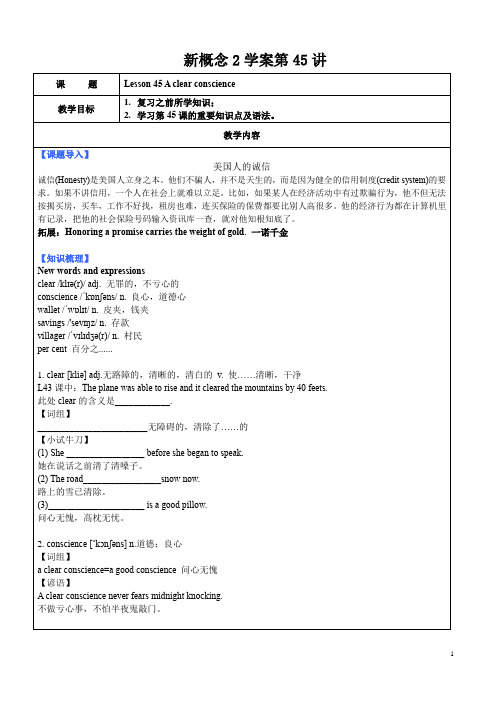
新概念2学案第45讲课题Lesson 45 A clear conscience教学目标1.复习之前所学知识;2.学习第45课的重要知识点及语法。
教学内容【课题导入】美国人的诚信诚信(Honesty)是美国人立身之本。
他们不骗人,并不是天生的,而是因为健全的信用制度(credit system)的要求。
如果不讲信用,一个人在社会上就难以立足。
比如,如果某人在经济活动中有过欺骗行为,他不但无法按揭买房,买车,工作不好找,租房也难,连买保险的保费都要比别人高很多。
他的经济行为都在计算机里有记录,把他的社会保险号码输入资讯库一查,就对他知根知底了。
拓展:Honoring a promise carries the weight of gold. 一诺千金【知识梳理】New words and expressionsclear /klɪə(r)/ adj. 无罪的,不亏心的conscience /ˈkɒnʃəns/ n. 良心,道德心wallet /ˈwɒlɪt/ n. 皮夹,钱夹savings /'sevɪŋz/ n. 存款villager /ˈvɪlɪdʒə(r)/ n. 村民per cent 百分之......1.clear [kliə] adj.无路障的,清晰的,清白的v. 使……清晰,干净L43课中:The plane was able to rise and it cleared the mountains by 40 feets.此处clear的含义是____________.【词组】________________________无障碍的,清除了……的【小试牛刀】(1) She _________________ before she began to speak.她在说话之前清了清嗓子。
(2) The road_________________snow now.路上的雪已清除。
新概念二 Lesson45 课后练习

新概念二Lesson 45 课后练习填空。
1.最终、迟早____________2.用这样的方式____________3.half the money____________4.存款____________5.村民____________6.皮夹,钱夹____________7.问心无愧____________ 8.百分之……____________课文填空。
The whole village soon learned that a large sum of money . Sam Benton, the local butcher, had lost his while taking histo the post office. Sam was sure that the wallet must by one ofthe , but it him. Three months passed, and then one morning, Sam found his wallet outside his front door.It in newspaper and it contained half the money he had lost, together with a note which said: ‘A thief, yes, but only 50 per cent a thief!’Two months his wallet later, some more money Sam with another note: ‘Only 25 a thief now!' In time, all Sam's money in this way. The last note said: ‘I am 100 per cent honest now!’根据句意和汉语提示完成句子。
1. I suggest that he put an advertisement in the (当地的) paper,2. They were not very rich so buying a house had taken all their(积蓄).3. The enemy entered the country and killed many (村民)4.I have (包裹) up the gifts and they're ready to be posted.5. It was commonly believed that he was an (诚实的) man.根据句意,用方框内所给单词或短语的适当形式填空。
(完整版)新概念英语第二册第45课
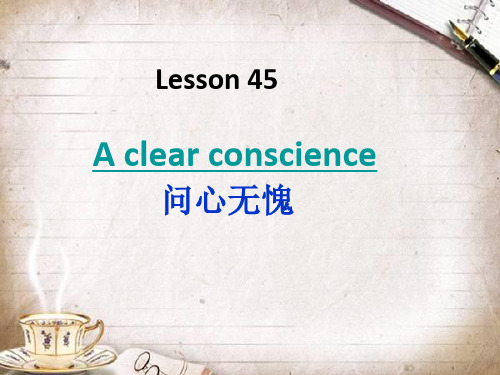
6)was/were being done d when I was there. 7)shall/will be done 一般将来时
Hundreds of jobs will be lost if the factory closes.
我们既可以说 half the money,也可以说 half of the money,它们可以互相替代,但是 money前都必须有the,因为是指特定的钱。 再如:
这面包有一半已变质了。
Half the bread/ half of the bread was bad.
6.In time, all Sam‘s money was paid back in this way. (1)in time可以表示“经过一段时间”或“最终”、 “迟早”: In time, he found all the books he needed. 一段时间以后,他找到了他需要的所有书。
被动语态
一、什么是语态?
语态是英语动词的一种表现形式,用来说明主语和谓语动词 之间的关系。
二、语态的种类: (1)主动语态 (2)被动语态
三、被动语态的构成:(八种时态下的被动语态)
1) am/is/are +done (过去分词) 一般现在时 Visitors are asked not to touch the exhibits.(展品) 2) has /have been done 现在完成时 All the preparations for the task have been completed 3)am/is /are being done 现在进行时
我I'l最l te终ll/yo总u有ev一e天ry会th把ing一i切n t都im告e诉. 你的。
新概念英语第二册Lesson43~45课文详注

【导语】为了⽅便同学们的学习,⽆忧考为您精⼼整理了“新概念英语第⼆册Lesson43~45课⽂详注”,希望有了这些内容的帮助,可以为⼤家学习新概念英语提供帮助!如果您想要了解更多新概念英语的相关内容,就请关注⽆忧考吧!新概念英语第⼆册Lesson43课⽂详注 1.In 1929, three years after his flight over the North Pole, the American explorer, R. E. Byrd, successfully flew over the South Pole for the first time. 美国探险家 R·E·伯德在飞越北极3年之后,于1929年第1次飞越了南极。
(1)这句话包含两个同位语。
three years after…为 1929的同位语,作插⼊性的补充说明;R.E.Byrd 作 the American explorer 的同位语。
(2)for the first time 表⽰“第⼀次”,time在这⾥表⽰“次”、“回”,还可以说 this time, last time, next time, another time, each time, for the last time等: I remind you for the last time that if you don't hurry, you'll miss the train. 我最后⼀次提醒你,如果不快点,你会误了⽕车的。
Give him these photos next time you see him. 下次你见到他时把这些相⽚给他。
2.Though, at first, Byrd and his men were able to take a great many photographs of the mountains that lay below, they soon ran into serious trouble. 虽然开始时伯德和他的助⼿们拍下了飞机下⾯连绵群⼭的⼤量照⽚,但他们很快就陷⼊了困境。
新概念二Lesson 45 知识点整理

(六)主动语态变被动语态的方法(1)My auntinvitedmeto her dinner party.
主语谓语宾语
→Iwas invited(bymy aunt) to her dinner party.
主语谓语宾语
(2)The schoolset up a special class to help poor readers.
→ A special class to help poor readers was set upin the school.
1.把主动语态的宾语变成被动语态的主语。
2.把主动语态的谓语变成被动语态的be +过去分词,时态要与原句保持一致。
A present was given to me yesterday.
注意:1.一般在下列动词后,常在间接宾语前用介词 to,如:bring, give, hand, lend, offer, pass, pay, promise, sell, show, take, teach, tell等。
(1) The book was showed to the class.(2) My bike was lent to her.
Lesson45A clear conscience问心无愧
学
习
目
标
全
解
必记单词
clearadj.无罪的,不亏心的
consciencen.良知,良心
wallet n.皮夹,钱包(男用的)
savingsn.存款,储金
- 1、下载文档前请自行甄别文档内容的完整性,平台不提供额外的编辑、内容补充、找答案等附加服务。
- 2、"仅部分预览"的文档,不可在线预览部分如存在完整性等问题,可反馈申请退款(可完整预览的文档不适用该条件!)。
- 3、如文档侵犯您的权益,请联系客服反馈,我们会尽快为您处理(人工客服工作时间:9:00-18:30)。
They took the risk of being arrested and robbed the bank. 他们冒着被逮捕的危险抢劫了那家银行。 注意 steal和 rob与介词的不同搭配: steal(sth.) from(sb./ some place), rob(sb.) of(sth.)。
2.conscience n. ['kɔnʃəns] 良心, 道德心 • wallet n. ['wɔlit] 皮夹,钱夹 • savings n.['seɪvɪŋz] 存款 • villager n. ['vilidʒə]村民 • per cent [pə'sent]百分之……
Watch the video again and pay attention to the intonation and pronunciation.
2.The whole village soon learnt that a large sum of money had been lost. 整个村子 很快知道,有一大笔钱丢失了。 (1)village在这里为总称,指“村民”,the whole village指“全村的人”,后面通常跟单 数动词(有时也可视为复数): The whole village excited by the was news. 这消息使全村的人兴奋。 (2)learn在句中的含义为“获悉”、“得 知”: I've just learnt that she was ill.
2.pay back (1)偿还: All Sam's money was paid back in this way. 萨姆全部的钱都用这样的方式还了回来。 Yesterday Sam borrowed some money from me and said that he would pay me back in a week. 昨天萨姆从我这里借了些钱,并说一周后还我。 (2)报答;向„„报复: You've been very kind to me. How can I pay you back? 你对我太好了。我如何报答你呢? He embarrassed me at the party. I'll pay him back someday. 在晚会上他让我难堪了。总有一天我会报复他的。
The whole village soon learnt that a large sum of money had been lost. Sam Benton, the local butcher, had lost his wallet while taking his savings to the post office. Sam was sure that the wallet must have been found by one of the villagers, but it was not returned to him. Three months passed, and then one morning, Sam found his wallet outside his front door.
6.In time, all Sam‘s money was paid back in this way. 很快,萨姆全部的钱都用同样的方式还了回来。 (1)in time可以表示“经过一段时间”或“最终”、 “迟早”: In time, he found all the books he needed. 一段时间以后,他找到了他需要的所有书。
I'll tell you everything in time.
我最终/总有一天会把一切都告诉你的。 (2)in this way表示“用这样的方式”: You must pay attention to your spelling. In this way, you can become a good secretary in time. 你必须注意你的拼写。这样你才能最终成为一个好秘书。
steal与rob steal指“偷盗”、“窃取”,其行为通常是偷偷地、悄 悄地、不为别人所发觉;rob则指“抢夺”、“抢劫”,其 行为通常是明目张胆的: The man who stole my wallet took my address book as well. 偷走我钱包的那个人把我的通讯录也拿走了。 I lost my address book when that man robbed me of my bag. 当那人抢走我的包时,我的通讯录也没了。 Someone has stolen my bag from me. 有人把我的包偷走了。
He listened to music while cleaning the room.
他一边打扫房间一边听音乐。 如果是主语不一致则必须用从句:
He listened to music while I was cleaning the room.
我打扫房间时,他在听音乐。
4.Sam was sure that the wallet must have been found by one of the villagers„萨姆确信那钱包一定是被某个村 民捡到了„„ must用于对过去已发生的事进行推测时,后 面的动词要用完成式: When I arrived, he wasn't here. He must have left early. 我到这儿的时候他已不在了。他一定早走了。
被动语态
一、什么是语态? 语态是英语动词的一种表现形式,用来说明 主语和谓语动词之间的关系。 二、语态的种类: (1)主动语态 (2)被动语态 三、被动语态的构成:(八种时态下的被动语态)
1) am/is/are +done (过去分词) 一般现在时 Visitors are asked not to touch the exhibits.(展品) 2) has /have been done 现在完成时 All the preparations for the task have been completed 3)am/is /are being done 现在进行时 A new cinema is being built here. 4)was/were done 一般过去时 I was given ten minutes to decide. 5)had been done 过去完成时 By the end of last year, another new gym had been completed in Beijing.
It had been wrapped up in newspaper and it contained half the money he had lost, together with a note which said: 'A thief, yes, but only 50 per cent a thief!' Two months later, some more money was sent to Sam with another note: 'Only 25 per cent a thief now!' In time, all Sam's money was paid back in this way. The last note said: 'I am 100 per cent honest now!'
• New words and expressions 生词 和短语 1.clear adj. [kliə]
• adj.晴朗的, 清澈的;无愧的, 清白的; 清楚的, 明白的;畅通的, 无阻的 • adv.清晰地, 清楚地;完全, 一直 • vi.转晴 • vt.扫除, 清除;(从电脑中)消除(数据); 证明…无罪; 宣告…无罪
Language points in the Text
1.A clear conscience, (标题) 问心无愧。 clear在这里的含义为“清白的”、 “无罪的”,因此这个短语又可译为 “清白的良心”,相当于 a good conscience,反义词为 a bad conscience(感到内疚)。
6)was/were being done 过去进行时 A meeting was being held when I was there. 7)shall/will be done 一般将来时
Hundreds of jobs will be lost if the factory closes. 8) should/would be done 过去将来时 The news would be sent to the soldier's mother as soon as it arrived. 被动语态的特殊结构形式 1)带情态动词的被动结构 其形式为:情态动词+be+过去分词。 The baby can be taken good care of by the baby-sitter.
Hello !
Everyone !
ห้องสมุดไป่ตู้
Let’s have a
happy class!!!
Lesson 45
A clear conscience 问心无愧
I lost a large sum of money.
What should we do when we lost money.
Someone must have stolen my money.
我刚刚得知她病了。
3.Sam Benton, the local butcher, had lost his wallet while taking his savings to the post office. 当地的屠户萨姆·本顿在把存款送往邮局的途 中把钱包丢了。 taking为现在分词。与动名词相似,它也可以有自己 的宾语、状语等。在连词while之后,现在分词短语的 作用相当于一个时间状语从句:„while he was taking his savings to the post office。现在分词 这样用的前提是两个动词的主语是同一个,并且这两个 动作通常是同时发生的:
